外研版八年级上册重点语法复习总结
初二上英语外研版知识点归纳总结

初二上英语外研版知识点归纳总结英语外研版是我们初中英语教材的一种,旨在帮助学生提高英语听、说、读、写的综合运用能力。
下面是初二上英语外研版的知识点归纳总结。
一、语法知识点1. 时态和语态:学习一般现在时、一般过去时、一般将来时、现在进行时、过去进行时等的用法,以及被动语态的构成和用法。
2. 名词:了解普通名词、专有名词、可数名词、不可数名词等的基本用法,以及名词的复数形式和所有格的构成。
3. 代词:熟悉人称代词、物主代词、反身代词、指示代词等的用法和形式。
4. 冠词:理解定冠词、不定冠词和零冠词的区别和用法。
5. 形容词和副词:学习形容词和副词的用法、比较级和最高级的构成方式,并能正确运用。
6. 数词:掌握基数词和序数词的用法,以及它们在句中的位置。
7. 介词:了解常见的介词及其用法,如in、on、at、by等。
8. 连词:熟悉并能正确使用并列连词、选择连词、原因连词、结果连词等。
9. 从句:了解主从复合句的构成和用法,包括宾语从句和定语从句等。
二、词汇知识点1. 日常生活词汇:掌握与学生日常生活密切相关的词汇,如身体部位、学科、家庭成员等。
2. 动词短语:学习常用的动词短语,如get up、go on holiday、take care等。
3. 学科词汇:了解和掌握与英语学科相关的词汇,如book、notebook、dictionary等。
4. 食物词汇:熟悉和运用与食物相关的词汇,如fruit、vegetable、meat等。
5. 动物词汇:学习各种动物的名称,如elephant、panda、tiger等。
三、阅读技巧1. 短文阅读:熟悉短文的结构,能快速获取信息和理解文章的主旨。
2. 阅读策略:掌握一些有效的阅读理解策略,如扫读、略读、细读等。
3. 理解词义:通过上下文来推断词义,提高词汇理解和运用能力。
四、听力技巧1. 日常交际:提高听懂常用的日常交际语言,如问候、道歉、提问、回答等。
2. 短对话和长对话:理解并提取对话中的关键信息,回答问题或完成任务。
八年级外研版英语上册语法知识点总结与归纳
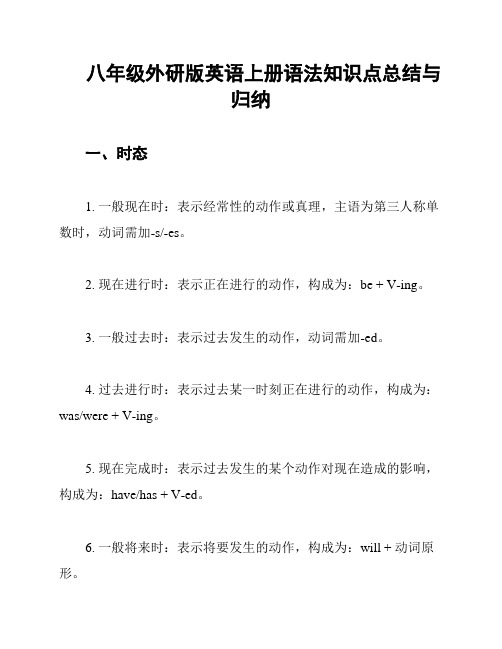
八年级外研版英语上册语法知识点总结与归纳一、时态1. 一般现在时:表示经常性的动作或真理,主语为第三人称单数时,动词需加-s/-es。
2. 现在进行时:表示正在进行的动作,构成为:be + V-ing。
3. 一般过去时:表示过去发生的动作,动词需加-ed。
4. 过去进行时:表示过去某一时刻正在进行的动作,构成为:was/were + V-ing。
5. 现在完成时:表示过去发生的某个动作对现在造成的影响,构成为:have/has + V-ed。
6. 一般将来时:表示将要发生的动作,构成为:will + 动词原形。
7. 现在完成进行时:表示过去开始进行的动作一直持续到现在,并可能持续下去。
构成为:have/has been + V-ing。
二、被动语态1. 被动语态的构成为“be + 过去分词”,被动语态的主语通常是动作的承受者。
2. 被动语态的时态和语态都可以通过助动词“be”加以表示。
三、情态动词1. 情态动词共有9个:can, could, may, might, must, shall, should, will, would。
2. 情态动词用于表示说话人的态度、感情或是某种推测,通常搭配动词原形使用。
四、关系代词1. who/whom:指人,作主语用who,作宾语或补语用whom。
2. whose:指人或物,表示所有关系。
3. that:指人或物,作主语、宾语、表语、定语等,引导限制性定语从句。
4. which:指物,作主语、宾语、表语、定语等,引导非限制性定语从句。
五、虚拟语气1. 虚拟语气用于表示现在或将来的假设情况或与过去相反的情况。
2. “if”引导的虚拟条件句中,主句通常要使用情态动词;与过去相反的虚拟语气要使用“were”。
六、倒装句1. 完全倒装:将助动词或情态动词提到主语前,用于表示强调或出乎意料的语气。
2. 部分倒装:将助动词、情态动词、系动词等提到主语前,用于表示疑问、否定、祝愿等语气。
最新外研版英语八年级上册知识点总结(精华版)

最新外研版英语八年级上册知识点总结(精华版)作者:邓华Module 1 How to learn English一.重点短语:try to do sth. 尝试做某事a piece of advice一条建议make a mistake犯错误three pieces of paper三张纸give sb. some advice给某人一些建议advise sb. to do sth. 建议某人去做某事write it down写下,记下this term这学期next term下学期ask for advice征求意见basic questions基本问题the meaning of……的意思talk to sb. 跟某人谈话write to sb. 写信给某人start a conversation开始一段谈话talk about sth. with sb.跟某人谈论某事as much / many as possible尽可能多地help sb.(to) do / with sth. 帮助某人做某事二.固定结构:1. practise doing sth. 练习做某事2. a number of +可数名词复数+V(复数)许多、很多3. the number of+可数名词复数+V(单数)……的数量9. one or two days一两天10. a (good ) way to do sth to do sth.做某事的(好)方法11. something new/old/interesting新/旧/有趣/的东西12. What about doing=How about doing…?做……怎么样?三.重点句型:1.What else? 还有什么其它的?2 It’s a good idea to do sth. 做…..是个好主意3. It is adj. + (for sb.) + to do sth. (对某人来说)做某事怎么样4. It is + adj. (形容词)+ (of sb.) to do sth.某人做某事某人怎么样. It is very kind of you to help me.你能帮我你真好。
外研版英语八年级上册所有知识点总结

• 15.all the time 一直
Module1——重点句型
• 一、提建议的句子: • 1.You(We) should do sth • 2.Let’s do sth • 3.Why not do sth • 4.Why don’t you(we) do sth • 5.How(What) about doing
• …for …有什么用
• 4. arrive at 到达(后接小地点) • 15. take…out of… 从…拿
• 5. once or twice 偶尔,一两次
出…
• 6. go off (灯)熄灭,(闹钟)响起 • 16. go across the road=
• 7.remember to do sth 记得去做某事
• 8. in the east of 在……的东部 • 9.be famous for=be known for • 因……而闻名 • 10.such as 比如 • lions of 数百万的 • 12.on the coast 在海滨,在海岸 • 13.be popular for 因…而受欢
• 7. on one’s way to…
• cross the road 过马路
• 在某人去…的路上
• 17. see/watch/hear sb do sth
• 8. run after 追逐,追赶
看见/听见某人做过某事
• 9. stop doing sth 停止做某事 • see/watch/hear sb doing sth • 看见/听见某人正在做某事
Module 8 重点词组
• 1. in time 及时 • 2. fall off… 从…跌落 • 3. pay attention 注意 • 4. pay attention to doing sth
外研版八年级上册数学重点短语+句型+语法

外研版八年级上册数学重点短语+句型+语法一、数学重点短语1. at least:至少2. as much as:和…一样多4. be made up of:由…组成5. go through:经历6. a number of:许多7. in order to:为了8. work out:解决;算出9. take turns (at):轮流做10. a great deal of:许多,大量的11. make a list of:列出清单12. by heart:背诵13. on average:平均15. according to:根据;按照二、数学重点句型1. How about doing...?……怎么样?2. Not only A but also B.不仅A而且B.3. It takes sb. some time to do sth. 做某事花费某人多长时间4. It's time to do sth. 到做某事的时间了.5. Why not do sth.? 为什么不做某事?6. I have no idea. 我不知道.7. Don't worry. 不用担心.8. How long does it take to do sth.? 做某事需要多长时间?9. What's the matter? 出了什么事?10. A is twice as big/much/many as B. A是B的两倍.三、数学重点语法1. 名词所有格的用法:'s或s'结尾(复数s结尾的名词加')表示所有:如Mary's book 玛丽的书;boys' books 男孩们的书。
2. 指示代词:this, that, these, those,表示距离远近或在时间上前后的不同;this, these表示靠近说话人的,that, those表示离说话人较远的;this, that还可用来代替名词。
(外研版)初中英语八年级上册知识点归纳总结
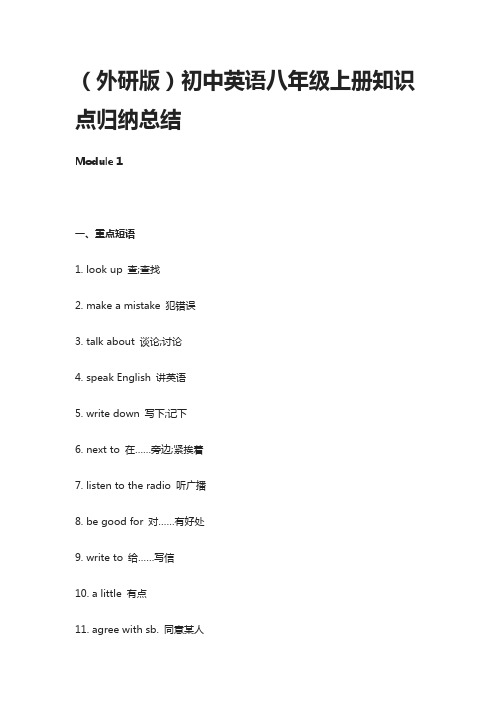
(外研版)初中英语八年级上册知识点归纳总结Module 1一、重点短语1. look up 查;查找2. make a mistake 犯错误3. talk about 谈论;讨论4. speak English 讲英语5. write down 写下;记下6. next to 在……旁边;紧挨着7. listen to the radio 听广播8. be good for 对……有好处9. write to 给……写信10. a little 有点11. agree with sb. 同意某人12. talk to 跟……交谈13. send sth. to sb. 把某物(发)送给某人14. ask for 请求15. watch films 看电影16. be from 来自17. smile at 冲……微笑18. go to bed 去睡觉19. get up 起床20. think about 考虑21. make friends with sb. 与某人交朋友22. take sb. around sp. 带领某人参观某地23. a few 几个;一些24. invite sb. to 邀请某人到……25. be good at 擅长26. for example 例如二、重点句型1. advise sb to do sth 建议某人做某事2. be afraid to... 害怕做……3. be good for... 对……有好处的4. be (a) great way(s) to do sth 做……的(一种)好方法5. It is natural to do sth. 做某事是合乎常情的。
三、重点语法1. Why not...? = Why don’t + you (we / they...)...?意为“为什么不……呢?”,后接动词原形。
eg:Why not / Why don’t we help the old cleantheir rooms this afternoon?今天下午为什么不去帮助老人打扫房间呢?2. What / How about...? 意为“……怎么样?”,其中about 是介词,后接名词或动词-ing 形式。
(完整word版)八年级上册英语外研版(新)各模块知识点归纳总结(全)文档,文档
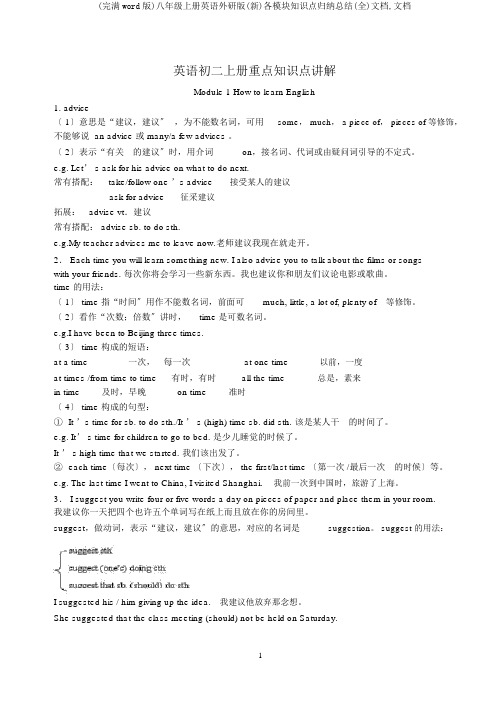
英语初二上册重点知识点讲解Module 1 How to learn English1. advice〔 1〕意思是“建议,建议〞,为不能数名词,可用some, much, a piece of, pieces of 等修饰,不能够说 an advice 或 many/a few advices 。
〔 2〕表示“有关的建议〞时,用介词on,接名词、代词或由疑问词引导的不定式。
e.g. Let’ s ask for his advice on what to do next.常有搭配:take/follow one ’s advice接受某人的建议ask for advice征采建议拓展:advise vt.建议常有搭配: advise sb. to do sth.e.g.My teacher advises me to leave now.老师建议我现在就走开。
2. Each time you will learn something new. I also advise you to talk about the films or songswith your friends. 每次你将会学习一些新东西。
我也建议你和朋友们议论电影或歌曲。
time 的用法:〔 1〕 time 指“时间〞用作不能数名词,前面可much, little, a lot of, plenty of等修饰。
〔 2〕看作“次数;倍数〞讲时,time 是可数名词。
e.g.I have been to Beijing three times.〔 3〕 time 构成的短语:at a time一次,每一次at one time以前,一度at times /from time to time有时,有时all the time总是,素来in time及时,早晚on time准时〔 4〕 time 构成的句型:①It ’s time for sb. to do sth./It ’ s (high) time sb. did sth. 该是某人干的时间了。
外研版八年级上册英语语法归纳总结

外研版八年级上册英语语法归纳总结3.形容词比较级的用法:(1)当两个人或事物(A和B)进行比较时,我们需要用到形容词的原级或者比较级①表达“A和B一样”,用as…as的结构。
公式: A+be动词+as+形容词原级+as…+Beg.: I am as tall as you.我和你一样高。
②表达“A不如B”用not as/so…as的结构。
公式:A+be动词的否定形式+as+形容词原级+as…+Beg.:I am not as tall as you.我没有你高。
③表达“A大于B”用“比较级+than”的结构。
公式:A+be动词+形容词比较级+than+B…e.g I am taller than you.我比你高。
(2)关于形容词比较级的更多用法6.副词原级的用法(1) 表示两者在某一方面程度相同时,用“as……as”结构,意为“和…一样地”。
公式:A + 实义动词 + as + 副词原形 + as + B例如:He swims as fast as I. 他和我游得一样快。
I play tennis as well as him (he dose).我网球打得和他一样好。
(2)表示两者在某一方面程度不相同时,用“not so(as)……as”结构,意为“不如,没有…”。
公式:A + 实义动词 + not+ as /so + 副词原形 + as + B例如:I can’t speak English so (as) fluently as you.我说英语不如你流利。
I can’t swim so fast as Jim.我无法游得像吉姆那么快。
*注意:在两者进行比较表示“A不如B”时,除使用“not...as/so+副词原级+as”结构外,还可以使用“less+副词原级+than”结构。
例如:He didn’t do his homework as carefully as his sister.=He did his homework less carefully than his sister.他做作业没有他妹妹认真。
外研版八年级(上册)英语语法总结的复习要点
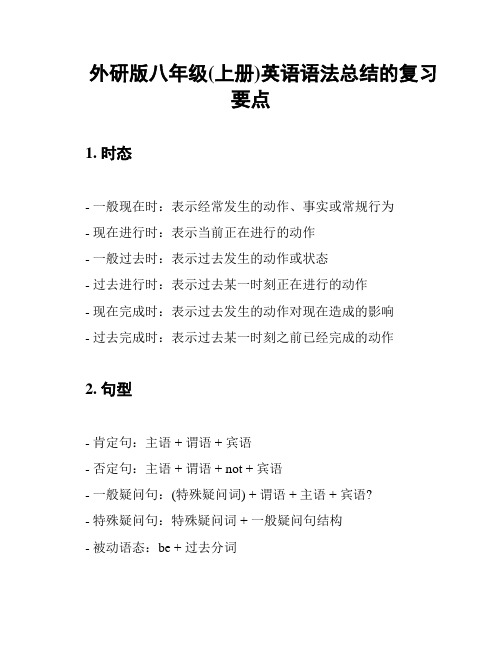
外研版八年级(上册)英语语法总结的复习
要点
1. 时态
- 一般现在时:表示经常发生的动作、事实或常规行为
- 现在进行时:表示当前正在进行的动作
- 一般过去时:表示过去发生的动作或状态
- 过去进行时:表示过去某一时刻正在进行的动作
- 现在完成时:表示过去发生的动作对现在造成的影响
- 过去完成时:表示过去某一时刻之前已经完成的动作
2. 句型
- 肯定句:主语 + 谓语 + 宾语
- 否定句:主语 + 谓语 + not + 宾语
- 一般疑问句:(特殊疑问词) + 谓语 + 主语 + 宾语?
- 特殊疑问句:特殊疑问词 + 一般疑问句结构
- 被动语态:be + 过去分词
3. 名词
- 可数名词:单数形式表示一个个体,复数形式表示多个个体- 不可数名词:表示一种整体或抽象概念,无复数形式
- 特殊名词:集体名词、物质名词等
4. 形容词和副词
- 形容词:修饰名词,通常放在名词前面
- 副词:修饰动词、形容词和其他副词
5. 介词
- 表示方位、时间、原因等关系
6. 从句
- 名词性从句:作主语、宾语、表语等
- 定语从句:修饰名词
- 状语从句:在主句中作状语
7. 情态动词
- 表示说话人的情感或态度,或表示能力、可能性等
8. 关系代词
- who, whom, which, that, whose等表示关系的词汇
以上为外研版八年级(上册)英语语法总结的复习要点,希望能帮助你顺利复习。
新外研版八年级上册M1M3语法复习

原级
good 好的 well健康的;好 bad 坏的 ill有病的 much许多 many许多
比较级 better worse more
最高级 best worst most
原级 little少的 far远的
old老的
比较级 less
farther further older elder
最高级 least
副词是指在句子中表示行为或状态特征的词,用来修饰动词、 形容词、其他副词或句子
a. 大部分副词是在形容词后直接加-ly构成的。例如: bad→badly careful→carefully quick→quickly b. 有些形容词与副词同形。例如: fast early hard high
副词比较级和形容词比较级的变化形式大致相同,也分为规则 变化和不规则变化
• He is a teacher
表示发生在过去的动作或存在的状态 yesterday,last week,in 2015,just now等 主语+was/were+....
主语+实义动词过去式 He was born on a sunny morning My father went to Beijing last year Was she angry just now?
c) 比较级 + and +比较级 表示 “越来越............”
The day is getting longer and longer Our city is becoming more and more beautiful
d) The + 比较级 ,the + 比较级 表示 “越........,就越.........”
外研版英语八年级上册重要知识点归纳总结
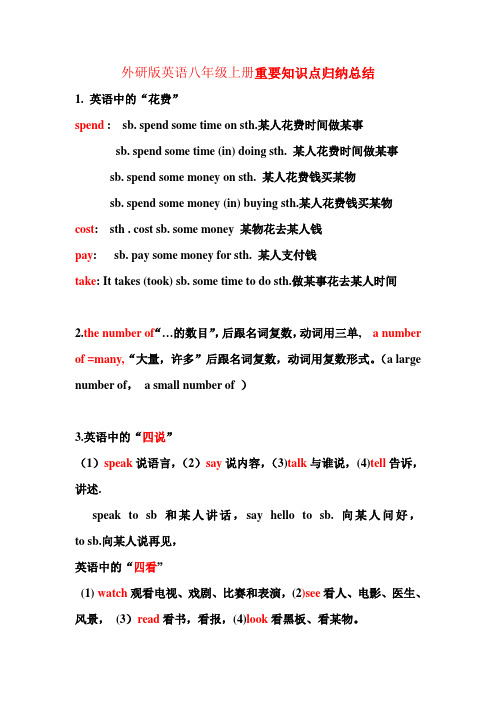
外研版英语八年级上册重要知识点归纳总结1. 英语中的“花费”spend : sb. spend some time on sth.某人花费时间做某事sb. spend some time (in) doing sth. 某人花费时间做某事sb. spend some money on sth. 某人花费钱买某物sb. spend some money (in) buying sth.某人花费钱买某物cost: sth . cost sb. some money 某物花去某人钱pay: sb. pay some money for sth. 某人支付钱take: It takes (took) sb. some time to do sth.做某事花去某人时间2.the number of“…的数目”,后跟名词复数,动词用三单, a number of =many,“大量,许多”后跟名词复数,动词用复数形式。
(a large number of,a small number of )3.英语中的“四说”(1)speak说语言,(2)say说内容,(3)talk与谁说,(4)tell告诉,讲述.speak to sb 和某人讲话,say hello to sb. 向某人问好,to sb.向某人说再见,英语中的“四看”(1)watch观看电视、戏剧、比赛和表演,(2)see看人、电影、医生、风景,(3)read看书,看报,(4)look看黑板、看某物。
4.It is +adj.+of sb +to do sth.写性格,品质,如:kind, good, nice , right, wrong, clever, careless, polite, foolish等。
It is+adj+for sb +to do sth. 对物的评价,如:difficult ,easy hard, dangerous, important,等5.表示“建议”的句型:(1). why don't you do sth?=why not do sth?(2). How about doing sth?=what about doing sth?(3). You should /can do sth.(4). Remember to do sth.(5)Don't forget to do sth.(6). can you do sth ?(7). Let's do sth.(8). It'sa good idea to do sth.(9).would you like to do sth.?(10).Shall we do…?(11)You’d better(not) do sth.回答:Thanks a lot.Great/ OK.That's right.All right.Good idea.Sure.6.形容词修饰不定代词somebody, some one“某人”,anybody,anyone “任何人”nobody,no one,“没人”,everyone,everybody“每个人”,something“某物”,anything“任何物”,nothing“没事”,everything “一切事物”时,要放在他们的后面(即后置)。
外研版八年级英语上册语法知识点汇总
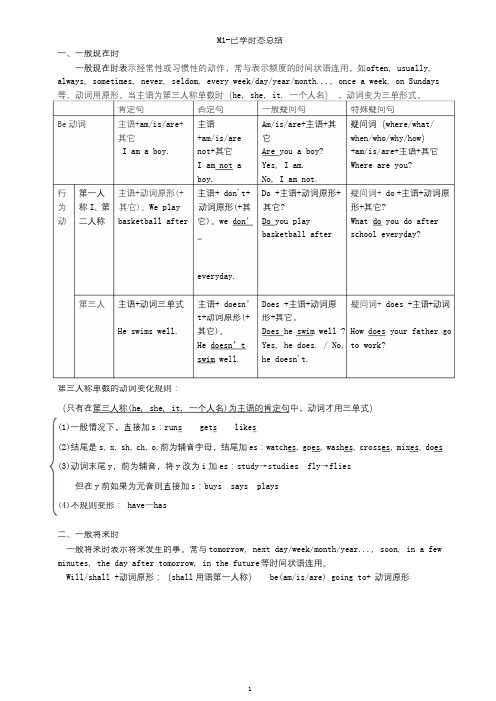
M1-已学时态总结一、一般现在时一般现在时表示经常性或习惯性的动作,常与表示频度的时间状语连用,如often, usually, always, sometimes, never, seldom, every week/day/year/month..., once a week, on Sundays 等。
动词用原形。
当主语为第三人称单数时(he, she, it , 一个人名) ,动词变为三单形式。
肯定句主语+am/is/are +主语 其它I am a boy. 否定句 一般疑问句 特殊疑问句 Be 动词 Am/is/are+主语+其 疑问词(where/what/ when/who/why/how ) +am/is/are 它 not+其它I am not aYes, I am. boy.No, I am not. 行 第一人 主语+动词原形(+主语+ don't+ Do +主语+动词原形+ 疑问词+ do +主语+动词原 Are you a boy? +am/is/are+主语+其它 Where are you? 为 称 I 、第 其它)。
We play 动词原形(+其 其它? 形+其它?动 二人称 basketball after 它)。
we don’ Do you playWhat do you do afterbasketball after school everyday? everyday.第三人 主语+动词三单式主语+ doesn’ Does +主语+动词原 疑问词+ does +主语+动词t+动词原形(+ 形+其它。
Does he swim well ? How does your father go He doesn’tYes, he does. / No, to work? swim well.he doesn't. He swims well. 其它)。
外研版八年级上册重点语法复习总结
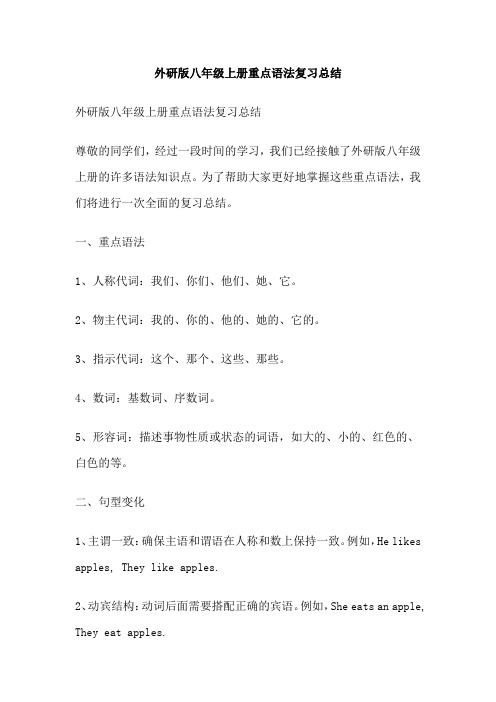
外研版八年级上册重点语法复习总结外研版八年级上册重点语法复习总结尊敬的同学们,经过一段时间的学习,我们已经接触了外研版八年级上册的许多语法知识点。
为了帮助大家更好地掌握这些重点语法,我们将进行一次全面的复习总结。
一、重点语法1、人称代词:我们、你们、他们、她、它。
2、物主代词:我的、你的、他的、她的、它的。
3、指示代词:这个、那个、这些、那些。
4、数词:基数词、序数词。
5、形容词:描述事物性质或状态的词语,如大的、小的、红色的、白色的等。
二、句型变化1、主谓一致:确保主语和谓语在人称和数上保持一致。
例如,He likes apples, They like apples.2、动宾结构:动词后面需要搭配正确的宾语。
例如,She eats an apple, They eat apples.3、直接引语和间接引语:引述别人的话时,需要使用直接引语或间接引语。
直接引语就是直接引用别人的原话,间接引语则是用自己的话转述别人的意思。
三、练习题1、将下列人称代词和物主代词填入空白处:My book is on the table. ______ book is on the table. I like ______ pet, but I don't like ______ pet. This is ______ bed, and that is ______ bed.2、将下列指示代词填入空白处:This is ______ pencil case, and that is ______ pencil case. ______ pencil case is blue, and ______ pencil case is red.3、将下列形容词填入空白处:She is ______ today, so she had a big breakfast. The weather is usually ______ in summer. My clothes are always ______ whenI wake up in the morning.四、总结通过本次复习,我们再次温习了外研版八年级上册的语法重点。
八年级上册外研版语法知识点总结
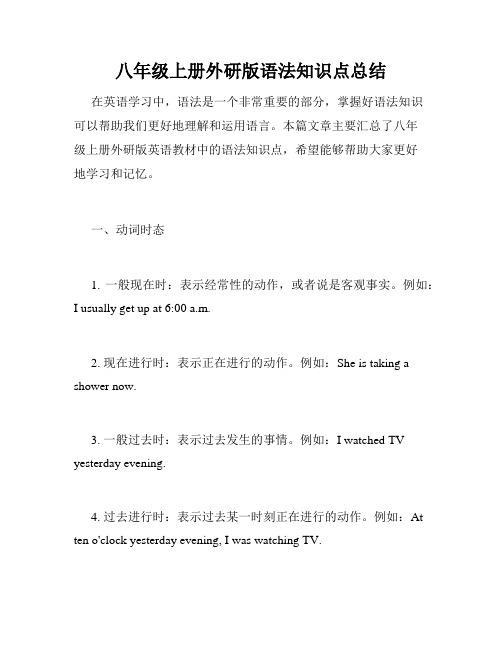
八年级上册外研版语法知识点总结在英语学习中,语法是一个非常重要的部分,掌握好语法知识可以帮助我们更好地理解和运用语言。
本篇文章主要汇总了八年级上册外研版英语教材中的语法知识点,希望能够帮助大家更好地学习和记忆。
一、动词时态1. 一般现在时:表示经常性的动作,或者说是客观事实。
例如:I usually get up at 6:00 a.m.2. 现在进行时:表示正在进行的动作。
例如:She is taking a shower now.3. 一般过去时:表示过去发生的事情。
例如:I watched TV yesterday evening.4. 过去进行时:表示过去某一时刻正在进行的动作。
例如:At ten o'clock yesterday evening, I was watching TV.5. 现在完成时:表示动作已经完成,与现在有关。
例如:Ihave finished my homework.6. 过去完成时:表示过去的某个时间点之前已经完成的动作。
例如:I had finished my homework before my mom came back.二、被动语态1. 一般被动语态:使用“be+V-ed”,表示主语是动作的接受者。
例如:The cake was made by my mom.2. 进行时被动语态:使用“be being+V-ed”,表示正在发生的被动动作。
例如:The table is being cleaned by a maid.3. 完成时被动语态:使用“have/has/had+been+V-ed”,表示动作已经完成的被动状态。
例如:The book had been read by me before.三、虚拟语气1. 虚拟语气用于表达非真实的情况,可以包括三种:①与现在事实相反:使用“were+主语”,例如:If I were you, I would buy this dress.②与过去事实相反:使用“had+V-ed”,例如:If I had known the answer, I would have told you.③表达目前可能或愿望:使用“should/would/could+V”,例如:If it should rain, we would stay at home.四、情态动词1. can/could:表示能力或者请求允许。
外研版八年级上册英语语法点汇总
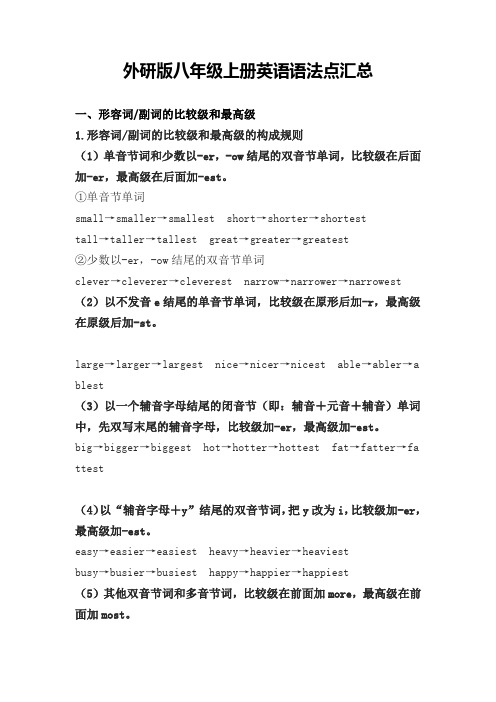
外研版八年级上册英语语法点汇总一、形容词/副词的比较级和最高级1.形容词/副词的比较级和最高级的构成规则(1)单音节词和少数以-er,-ow结尾的双音节单词,比较级在后面加-er,最高级在后面加-est。
①单音节单词small→smaller→smallest short→shorter→shortesttall→taller→tallest great→greater→greatest②少数以-er,-ow结尾的双音节单词clever→cleverer→cleverest narrow→narrower→narrowest (2)以不发音e结尾的单音节单词,比较级在原形后加-r,最高级在原级后加-st。
large→larger→largest nice→nicer→nicest able→abler→a blest(3)以一个辅音字母结尾的闭音节(即:辅音+元音+辅音)单词中,先双写末尾的辅音字母,比较级加-er,最高级加-est。
big→bigger→biggest hot→hotter→hottest fat→fatter→fa ttest(4)以“辅音字母+y”结尾的双音节词,把y改为i,比较级加-er,最高级加-est。
easy→easier→easiest heavy→heavier→heaviestbusy→busier→busiest happy→happier→happiest(5)其他双音节词和多音节词,比较级在前面加more,最高级在前面加most。
beautiful→more beautiful→most beautifuldifferent→more different→most differenteasily→more easily→most easily(6)有少数形容词、副词的比较级和最高级是不规则的,必须熟记。
good→better→best well→better→bestbad→worse→worst ill→worse→worstold→older/elder→oldest/eldestmany/much→more→most little→less→leastfar→further/farther→furthest/farthest2.形容词和副词比较级的用法(1)“甲+be+(倍数)+形容词比较级+than+乙”表示“甲比乙…”或“甲比乙…几倍”。
八年级上册英语重点语法外研版

八年级上册英语重点语法外研版第一节:一般现在时一般现在时是英语中最基本的时态之一,它表示习惯性的动作或者经常发生的动作。
在外研版八年级上册英语教材中,一般现在时的语法知识被重点介绍,学生需要掌握以下几点:1. 第三人称单数动词变化规则:在一般现在时中,第三人称单数形式的动词要在词尾加上-s。
例如:He goes to school by bus every day.2. 动作的频率副词:习惯性的动作或者经常发生的动作通常会使用频率副词来表达。
例如:I always do my homework after school.3. 一般现在时的疑问句和否定句:一般现在时的疑问句和否定句的构成也是学生需要掌握的重点之一。
例如:Does she like playing basketball? She doesn't like playing basketball.通过以上几点内容的学习,学生可以掌握一般现在时的基本用法,能够用简单的英语表达日常生活中的习惯和经常发生的动作。
第二节:比较级和最高级比较级和最高级是英语中用来表示事物在某一方面的大小、程度或者范围的重要语法知识点。
在外研版八年级上册英语教材中,比较级和最高级的用法被重点介绍,学生需要掌握以下几点:1. 比较级的构成规则:在比较级的构成中,一般情况下是在形容词或者副词前加上more或者-er。
例如:She is taller than her sister. The weather is getting colder.2. 最高级的构成规则:在最高级的构成中,一般情况下是在形容词或者副词前加上most或者-est。
例如:She is the tallest girl in the class. This is the most interesting book I have ever read.3. 比较级和最高级的用法:比较级用来进行两者之间的比较,而最高级则表示三者或者三者以上的比较。
外研版八年级上册英语语法归纳总结
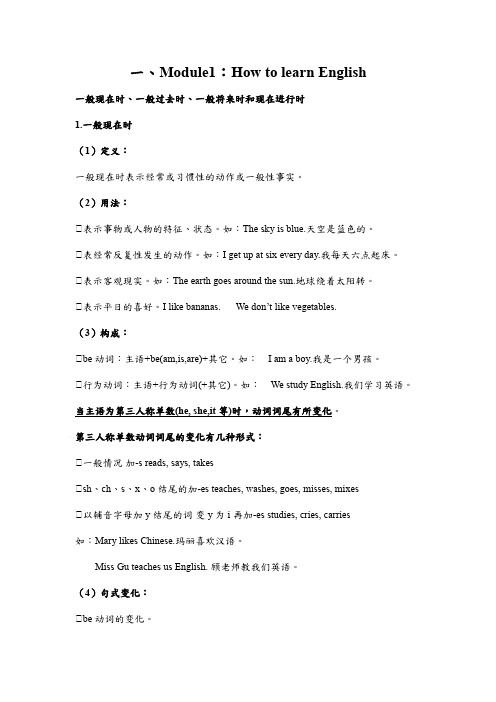
一、Module1:How to learn English一般现在时、一般过去时、一般将来时和现在进行时1.一般现在时(1)定义:一般现在时表示经常或习惯性的动作或一般性事实。
(2)用法:①表示事物或人物的特征、状态。
如:The sky is blue.天空是蓝色的。
①表经常反复性发生的动作。
如:I get up at six every day.我每天六点起床。
①表示客观现实。
如:The earth goes around the sun.地球绕着太阳转。
①表示平日的喜好。
I like bananas. We don’t like vegetables.(3)构成:①be动词:主语+be(am,is,are)+其它。
如:I am a boy.我是一个男孩。
①行为动词:主语+行为动词(+其它)。
如:We study English.我们学习英语。
当主语为第三人称单数(he,she,it等)时,动词词尾有所变化。
第三人称单数动词词尾的变化有几种形式:①一般情况加-s reads,says,takes①sh、ch、s、x、o结尾的加-es teaches,washes,goes,misses,mixes①以辅音字母加y结尾的词变y为i再加-es studies,cries,carries如:Mary likes Chinese.玛丽喜欢汉语。
Miss Gu teaches us English.顾老师教我们英语。
(4)句式变化:①be动词的变化。
否定句:主句+be+not+其它。
如:He is not a worker.他不是工人。
一般疑问:Be+主语+其它。
如:-Are you a student?-Yes,I am./No,I’m not.特殊疑问句:特殊疑问词+一般疑问句。
如:Where is my bike?①行为动词的变化。
否定句:主语+don’t(doesn’t)+动词原形(+其它)。
外研版八年级上册英语语法总结
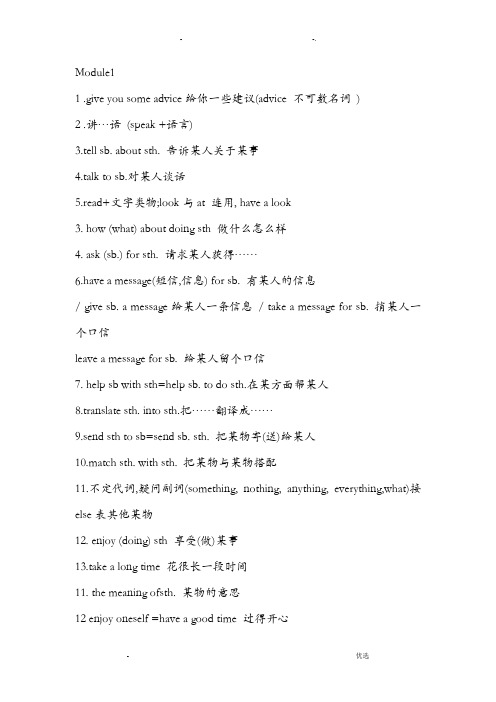
Module11 .give you some advice给你一些建议(advice 不可数名词)2 .讲…语(speak +语言)3.tell sb. about sth. 告诉某人关于某事4.talk to sb.对某人谈话5.read+文字类物;look与at 连用, have a look3. how (what) about doing sth 做什么怎么样4. ask (sb.) for sth. 请求某人获得……6.have a message(短信,信息) for sb. 有某人的信息/ give sb. a message给某人一条信息/ take a message for sb. 捎某人一个口信leave a message for sb. 给某人留个口信7. help sb with sth=help sb. to do sth.在某方面帮某人8.translate sth. into sth.把……翻译成……9.send sth to sb=send sb. sth. 把某物寄(送)给某人10.match sth. with sth. 把某物与某物搭配11.不定代词,疑问副词(something, nothing, anything, everything,what)接else表其他某物12. enjoy (doing) sth 享受(做)某事13.take a long time 花很长一段时间11. the meaning ofsth. 某物的意思12 enjoy oneself =have a good time 过得开心13 lots of sth. =a lot of sth. 许多14 start a conversation 开场谈话15 take a deep breath 深呼吸一下16 a piece of paper一纸18 best wishes给予最好的祝愿19 the number of sth. 某物的数量(后接动词单数)20. a number of sth.许多某物(后接动词复数)21. show / take sb around 带某人参观22.write down sth. 写下23.make mistakes 犯错24.do some concerts开音乐会25.on the Internet 在网上26. a good idea 一个好主意27. a pen friend 一个笔友28. school orchestra 学校管弦乐队29. in groups 分组30. each other 各自31. first of all= at first 首先32. what else 还有其他什么33. a piece of advice 一条建议34. borrow sth. from sb. 从某人借入某物lend sth. to sb.借某物给某人35.basic questions 根本的问题36.wele back 欢送回来37. in class 在课堂上38.next to 紧邻着……39.listen to sth. / sb. hear sth. / sb.40. everyday adj. 平常的,日常的every day 每天51. count the English words 数英语单词40 help sb. with sth. 帮助某人做某事=help sb. (to) do sth. 帮助某人做某事41make you shy 使你害羞make sb.+ adj. make sb. do sth.43 make a list 列个清单44.the best way to do sth. 做……的最好方法45. make friends 结交朋友46think about sth./ doing sth. 考虑, think of sth. / doing sth. 想出48 a new term 一个新学期49. in your notebook 在笔记本里51 read a newspaper看报纸64. say hello to sb. 向某人问好/问候52. start a club创立一个俱乐部53. what else还有什么吗54. thank you for doing sth./sth. =thanks for doing sth. / sth.为......向你表感55. It takes +时间/ 金钱+to do sth. 做某事花费多少时间或金钱56. practise (doing) sth.练习(做)某事57. be good at( doing )sth.擅长于(做)某事58. a piece of paper一纸,纸不可数59. always放系动词后,实意动词之前=all the time放句末(一直,总是)60. be good for (doing) sth. 对(做)某事有好处的61. It is + adj.(形容词)+ to do sth.做某事是怎么样的62. look for sth.. 寻找某物63. show / take sb. around 带着某人参观65. for example 例如smile at sb.向某人笑hear from sb. = get a letter from sb. 收到某人的来信, hear of sb. / sth. 听说某人或某物hear about sb./ sth. 听说关于某人或某物建议句型:You should (not )do(原形) sth.你应该(不)做……2 Why don't you do(原形)sth.=Why not(原形)do sth.你为什么不做… / 为什么不做…3 How about doing sth. = What about doing sth. 做……怎么样4 It's a good idea to do(原形)sth. 做某事是一个好主意半功5 try to do (原形)sth. 试图做某事6 try not to do(原形) sht.试图不做某事7.remember to do (原形)sth. 记得做某事8.Don't forget to do (原形)sth.不要忘记做某事9. It is a good way to do (原形)sth. 做某事是一个好方法/方式.Module2by plane= take a plane fly to + 地方=take the plane to + 地方=go to + 地方by plane.1 . travel around the world环游世界2 on TV 在电视上3 invite sb to do sth 邀请某人去做某事4 the price of sth. 某物的价格5 all over 普及6take off 起飞land着陆7 Spring Festival 春节8write about sth. 写关于……9 western food 西餐10a fantastic experience 一次奇妙的经历11more than =over 超过13 give concerts 开音乐会14 enter( =take part in )a petition 参加竞赛15 sell out 卖光16 sound brilliant sound+ adj.形容词听起来好极了17 taste delicious taste + adj.形容词尝起来美味的18what kind of… 什么的种类……19what's the price of …什么的价格……20have / has been to+地方去过某地(已回来)21a wonderful experience 一次极好的经历22have a wonderful time 过得开心23e true 实现24 in newspaper 在报纸里25 roast duck 烤鸭27 take photos 拍照28 the Great Wall 长城29 Beijing Opera 京剧30cook dinner煮饭31 play the piano 弹钢琴32.cabin steward 客舱乘务员34 have / has gone to +地方去了某地(还没回来)35.again and again 一次又一次36. stay with sb. 与某人呆在一起37. dream (v.) of / about+名词/ 代词或动名词: 梦想关于also,too 也also放于句中,too放于句末38. anywhere 用于否认或疑问句哪些地方39. be / go abroad 在/ 去外国40.try to do sth. 尽力去做某事41. Chinese musician 中国音乐家42. How many times…多少次……43.the first prize 第一份奖品44. look at sth. 看某物45. Italian food意大利食品46. one of the boys 其中的男孩之一(后用动词单数) one of sth. 某屋之一47. the first prize 一等奖48. have / has been in+地方在某地住了(多久)49. It is + a / an + adj. + n. + to do sth.做某事是怎么样的.at the end = finally= at lastanother+名词单数(三者中) 另一个…One …the other… 一个…另一个…do sth. better更好地做某事现在完成时里副词用法:ever为副词=at any time 在任何时候,曾经,常用于疑问句,否认句,比拟状语从句以及条件状语从句;never为副词,绝不,从来没有, 用于情态动词,助动词,be动词之后或实义动词之前; 以前before用于述句和疑问句中,放在句末;yet用于否认句,有时可用于一般疑问句,放于句末; already已经一般用于肯定句中句型:Have / Has sb. ever done sth.Have / Has sb. done sth. yetSb. have / has done sth. yet.Sb. have / has already done sth.Sb. have / has been to +地方Sb. have / has gone to +地方Sb. have / has done sth. before.Sb. have / has never done sth.规那么动词的过去分词变化与过去式一样,要求掌握的不规那么动词现在完成时变化,参见课本199和200页.Module3复习资料What are you up to = What are you doing 你正在做什么What do you reckon 你认为怎么样Don't panic ! 别紧!Make a model 做一个模型In space 在太空On the space station 在太空站上The latest news最新的新闻solar system 太阳系space shuttle = spacecraft太空飞船10. a small part of… ……的一小局部11. so far 到目前为止12. speak to 对…说13.hear about 听说关于……14. millions of 数以百万15. go around 围绕……转16. at night 在晚上17. finish doing… 完成做……18. as good as…与……一样好19. write back 写回/ 回信20.send … to… 发送……21. in the universe 在宇宙22. in my life 在我的生命里23. none of sb. /sth. (没有)接谓语动词单数形式24.on earth 在地球上25. no one (没有人)接谓语动词单数形式26.so… that 太……而…….28.several months几个月29. on business 出差30. discover life 发现生命31. bring … back 带……回来34. an environment with air 有空气的环境35. 200 billion 两千亿36. beyond the solar system 远离太阳系discover sth. find sth.38. give us a break 别再烦我们了show sth. to sb. = show sb. sth.bring sb. sth.=bring sth. to sb.give sb. sth.=give sth. to sb.lend sb. sth. = lend sth. to sb.pass sb. sth.= pass sth. to sb.write sb. sth. =write sth. to sb.tell sb. sth.=tell sth. to sb.teach sb. sth. = teach sth. sb.buy sb. sth. = buy sth. for sb.show sb. aroundbring sb. sth. = bring sth. to sb. take sth. to sb.have / has gone to +地方arrive at / in = get to= reach(yet用于现在完成时否认和疑问,放句末.already用于现在完成时的肯定,放于句中. just ,by this time, ever ,never ,before, several times ,since ,up to now ,so far ,recently ,lately ,for a long time)however然而,放于句子开头there have / has been ; there will be=there is / are going to be;find / find out / look forsth. + cost+sb. + moneysb. pay money for sth.sb. spend meney on sth. / in doing sth.It takes sb. some time to do sth.prefer +n. / doing sth. to n. / doing sth. 比起…,更喜欢… prefer to do … rather than do… 宁愿做…而不愿做…in the past 在过去How longalone副词修饰行为动词, lonely形容词修饰名词each of + 名词复数接谓语动词单数,each+名词单数接谓语动词单数Module4复习资料1.take part in参加2.get on well with 与……相处融洽3.hear about 听说关于4hear of听说……5drop out of school 缀学6 look after =take care of 照顾7raise sth.筹集某物8 pay for支付9how long 多久10Project Hope希望工程11head teacher校长;班主任12with the help of =with one's help 在……的帮助下13 because of由于……14 thousands of数以千计15an eight—year —old boy==an eight years old boy一个八岁的男孩16in the last(past) +数字+年份在过去的某年里18stop doing sth停顿做某事19.get an education承受教育20in the countryside 在乡下21train teachers训练/培训教师22with no electricity= without electricity 没有电23.But(但是,后接表转折的句子)24.I like English but I don't like Chinese.25. so(因此,后接结果的句子)on earth终究,到底on the earth在地球上for + 表示一段时间的短语;since + 表示过去时间点的短语;since +表示过去的时间状语从句; since+一段时间+agoIt + 形容词+to do sth.get on / along with sb. / sth. 和某人相处…… / 某事进展In factall over Chinateach sb. sth.a little , little; a few, fewin the last / past +时间Sb. pay money for sth.because of +名词,名词短语因为… because+接一个从句So far具体数字+hundred, thousand, million, billion; hundreds of , thousands of , millions of, billions ofand 用于肯定的述句中;or或者用于否认的列举;but但是表示转折句型:How long have / has sb. done(持续性动词过去分词) sth.三副词近义:perhaps"大概,或许"放于句子开头probably"大概"放于be,行为动词前,情态动词后;, maybe"也许"放于句子开头be in good health=healthybe in bad health It is important to do sth. Sb. stop doing sth.Module5复习资料1.on earth到底2.of course 当然3.school orchestra 学校管弦乐队4.pop music 流行音乐5.classical music 古典音乐6.rap music 说唱音乐7.Beijing Opera 京剧8.at the age of 在……岁时9.make records 制作唱片10.in addition to 除……以外11.not only …but also … 不但……而且……12.be famous for 因……而著名13.Play the drums / guitar / organ / piano / trumpet / violin14.be born …….出生15.now and then 从现在起16.the capital city 省会lively , livingelder, older17.the centre of 中心……18.Who is it by 这是谁创作的Of course= sure= certainly19.a fan 一个爱好者20.hundreds of 数以百计part-time full-time21. show / take sb. around 带某人四处参观22.the rest of the world 世界的剩余局部23.translate … into…把……翻译成…..24. tell sb sth. 告诉某人某事; tell sb. (not) to do sth.告诉某人(不)去做某事;tell sb. about sth. 告诉某人关于某事25. wait for a moment 等一会26. be interested in sth. / doing sth. 对……感兴趣27. Hope Schools 希望学校28. sb. was / were doing sth. + when + sb. did sth. 当某人做……的时候,某人正在做什么.29. a bookshop 一个书店30. sit beside 坐在旁边31.cheer for为……喝彩32.Sth. costs (sb). some money…物花了某人……钱.句型:反意义疑问句前面述肯定,后用否认简单问句; 前面述否认,后用肯定简单问句.答复肯定的就肯定,答复否认的就否认.特殊反意义疑问句快速记忆:1. 述局部主谓语是I am …时,反意疑问句用aren't I,而不是am not I.2. 当主语是指示代词this或that时,反意疑问句的主语用it,当述局部的主语是指示代词these或those时,其反意疑问句的主语用they.3. 当主语是不定代词one时,反意疑问句的主语可用one,也可用you(美式英语用he).4. 当have/has不是表示"有"的意思,并在句中做谓语时,其反意疑问句的助动词要用do,does,did.5. 述局部有have to时,其反意疑问句要用助动词的否认形式.6. 述局部是there be句型时,反意疑问句中要用there.7. 述局部含I think (believe,suppose…)that…构造时,其反意疑问句须与从句的主谓语保持一致,注意主句的主语必须是第一人称.8. 述局部主语是动名词,从句,不定式短语形式时,反意疑问句的主语应该用it.9. 述局部含有few,little,hardly,never,not,no,no one,nobody,nothing,none 等这些表示否认意义的词时,其反意疑问句需用肯定构造.10. 述局部的主语是everything,nothing,anything或something时,反意疑问句的主语应用代词it.11.当主语是everybody,everyone,anybody,anyone,somebody,someone,nobody,no one,none,neither时,反意疑问句的主语要用复数代词they.12. 祈使句一般加上will you或won't you构成反意疑问句;用will you 多表示"请求",用won't you多表示提醒对方注意.如:Let引导的祈使句有两种情况:(1)Let's后的反意疑问句用shall we.(2)Let us/me…后的反意疑问句用will you或won't you.13. 感慨句后加反意疑问句时,其反意疑问句需用be的一般现在时的否认形式.14. 含否认意义的词在述局部做动词的宾语时,反意疑问句可用肯定构造,也可用否认构造.Module6复习资料1.How is it going =How are you 你好吗2. run past / across 跑过3. fall down 跌落4. go off 熄灭5.have a party 开晚会6. by a river 在河边7.a big storm 一场大暴风雨8. smile at 向……微笑9.all kinds of 所有种类10.out of breath 上气不接下气11.get tired 感到疲倦12.have nothing to do 没有事情去做……/ 与……无关get offwhat … for = Why…Fall in love with sb. /sth.at noon once or twicehave a party=hold a partyjump out of sth.during +时间13. think of认为, 想想14.take …out of… 拿出……at noonwear put onstop doing sth. stop to do sth.15. get up 起床16.get out 出去,滚开17. look into 往里看18. tea party 茶会19.go into 进入20. nothing strange 没有什么奇怪的21. …be outside …….在外面Once 一次,从前,一旦at once once upon a time once againtake care of sb. = look after sb.be sure of / about sth. be sure to do sth. be sure 接句子Sb./Sth. is / are doing sth. when Sb. / Sth. +do / does sth. Sb./Sth. was / were doing sth. when Sb. / Sth. +did sth. 表示一个动作正在发生,另一个动作又发生了.句型:was / were doing sth. 过去进展时过去进展时常用的时间状语:at this time, at this time, at that moment, all day yesterday, from nine to ten last evening, 过去进展时句子+when sb. did sth. , Sb. did sth. +while+过去进展时句子,at that time,(点钟+过去时间短语,at nine o'clock last night)Module7 Unit1复习资料1.smell delicious闻起来美味的smell +adj.2. feel tight摸起来紧的feel + adj.3. look strong看起来强壮的look + adj.4. smell sour闻起来酸的smell + adj.5. taste salty尝起来咸的taste + adj.6. sound quiet听起来安静的sound + adj.7. make a pizza做比萨8. have some!吃一些吧!9. What's the matter with sb. 什么事=What's wrong with sb.10.too strong气味太浓,太强壮too+ adj.表示太…11. I am afraid.我害怕. be afraid of (doing) sth.12. chocolate cookies巧克力甜饼13. have a try!试一下吧!14. really sweet真的甜really + adj.15. much better好得多much+ 比拟级16. a lovely sweater穿一件得意的毛衣17. soft and fortable软和舒服的18. you both你们俩,both放于行为动词前,be动词后.19. much food.许多食品much+ 不可数名词; many+可数名词复数20. have a party开会21. What's she like 她是怎么样的人或她长得如何What does / do sb. look like23. have a look看一看25. e back回来26. something to eat/drink一些吃/ 喝的东西27. introduce sb. to sb. 把……介绍给……30.See you later.一会儿见.Module7 Unit2复习资料thanks for sth. ; thanks for doing sth.……last message上一封信hear from收到……的来信=get a letter fromcan't wait to meet you迫不及待地想见到你-- can't wait to do sth.I hope to do sth. / hope + 从句…我希望……recognize me认出我arrive at the airport到达机场arrive at / in +地方=get to+地方= reach+地方quite tall挺高的quite+形容词:很,十分……short fair hair金色短发\10. wear glasses戴眼镜11. wear put on12. Journey旅行13. carry, take 带一件厚外衣14. I am sure.我肯定.15. each other对方,互相18. spend a lot of time with school orchestra很多时间都在学校交响乐队(训练)spend 花费,sb. spend (s) sth. in doing sth. /sb. spend(s) sth. on sth.19. dance music舞曲20. love dancing爱跳舞love sth. / love doing sth.21. enjoy sports 喜欢运动enjoy sth. / doing sth.22. as well还,也= too23. especially tennis特别是网球24. captain of… ……的队长25. be proud of sb.为……而自豪/骄傲26. work hard努力工作27. feel stupid觉得很傻,笨28. get bad marks取得不好的成绩29. get angry with myself生自己的气get angry with sb.=be mad at sb. 生某人的气31. at first首先=first of all32. feel a bit sad感到有点儿悲伤a bit + 形容词33. a few days几天34. quite shy十分,相当腼腆,害羞的quite+形容词36. feel nervous感到紧37. speak Chinese说中文speak + 语言38. do something wrong做错事39. help me do the right things帮助我不做错事help sb. do sth.41. be excited about (doing) sth.42.must 必须;后接动词原形43.shake hands with sb. 握手44.stare at sb.盯着某人看句型:What does / do sb. look like What is/ are / am sb. likeModule8 Unit 1 复习资料1.问路:How do I get to+地方= Can you tell me the way to +地方=Where is the way to +地方到达: get to ,reach, arrive at / in2. show me a map of Beijing给我出示一地图Show sb. sth.=show sth. to sb.4. on the left在左边在左边或右边用on on the right在右边8. go straight ahead一直向前走9. be opposite+地方在……的对面10. I see.=know我懂了. / 我知道.12. between … and … 在……之间(表两者之间); among用于三者或以上13. the way to + 地方去某地的路15. kind of quiet.有点儿安静kind of 有点儿+形容词16. go across(从外表)穿过go through (从部)穿过17. turn left into转左进入18. turn right into转右进入19. I think+句子…我认为…… / I don't think +句子20. an entrance一个入口21. on the corner of+地方在某地的拐弯处22. do some shopping=go shopping购物23. ask about sth. 问关于…..24. The best place最好的地方25. go along沿着Module8 Unit2 复习资料1.on your right 在你的右边3. in the middle of+地方在某地的中间5. a museum with lots of famous paintings一个藏有许多画的博物馆with , without12. most of sth. 某物的大多数13. The best way to do sth. is +形容词.做某事的最好方式是怎么样.14. as you go along the river当你沿着河走时as 在此=when; as 还有"作为", "像"的意思15. get on上(船,车)get off下(船,车)18. next to紧挨着, 靠近20. take the boat back along the river.乘船沿河回去21. go past +地方走过…22. walk along+地方沿着某地走24.卖sell sb. sth. = sell sth. to sb.25. lots of许多lots of = a lot of28. at the square在广场29. 完毕,完成:finish sth. finish doing sth.Module8 unit3 复习资料6. get something to eat拿一些吃的东西7. on the wall在墙上8.science lab科学实验室9. Get a guidebook拿到一本指南Module9 Unit1复习资料1.需要need to do sth. /need +n. / pron.2. protect sb. / sth. 保护,防护某人/某物protect sth.from sth. / doing sth. 保护sth. 免受sth.的伤害5. live in +地方住在……里9. 有with (doing) sth. ; 没有without (doing) sth.10. Which animals … 哪种动物……11. talk about sth. 谈论关于……12. in danger处于危险中13. Sb. be excited to do sth. 做某事是冲动的.14. at last最后=finally=at the end15. know about 了解16. think about 考虑17. make sb. mad使某人感到极度冲动的make sb. do sth. 使某人做某事make sb. adj.使某人变得怎么样18. It's hard to do sth. 做某事是难的.21. grow bigger开展得更大停顿某事stop sth. 停顿做某事stop doing sth. 停下来去做某事stop to do sth.19. have no place to live in.没有地方生活.20. The surprising thing 令人惊讶的事情.surprising 修饰物; ,surprised 修饰人22. take away带走,拿走24. Sth. isn't good to do sth. 某物是不适宜做某事的25. really awful.真的令人讨厌.really 放于行为动词,形容词,定冠词前26. live in peace住在安宁中27. 决定(不)做某事decide (not ) to do sth.28. on earth到底29. find out 找出, 发现33. bee rare变得稀少30. What is the matter with sb. =What is wrong with sb. 某人出什么事了31. too … to… 太……而不能……32. too many animals太多动物too many+可数名词复数太多too much + 不可数名词34.examples of sth. …例子for example 例如= such as36. I am sad / happy / sorry /to do sth.做某事令我感到悲伤/快乐/抱歉/惊奇的.Module9 Unit 2复习资料1.努力工作work hard2. one of the animals most in danger.最危险的动物之一.One of +可数名词复数:某物之一, 表单数后接动词单数3. about 1,000大约一千4. nature reserve自然保护区.5. zoos and research centres动物园研究中心6. look after照顾=take care of7. Southwest China中国西南地区8. live on 以……为食/ 生9. each +名词后接动词第三人称单数形式每个……11. bee smaller变得更少12. different reasons不同原因13. less and less 接不可数名词fewer and fewer接可数名词more and more 越来越多形容词的比拟级+and+比拟级:越来越……15. more than超过,多于=over22. in the world在世界上16. enough food足够的食物enough放于名词前,放于形容词后big enough17. make a new plan 制定一个新方案18. grow better生长得更好19. go back回去20. most people大多数人21. one of + 最高级+名词one of ……之一其中最…的某物之一24. still a long way to do sth. 做某事仍需走很长的路.a long way to go 路还很长,还需要努力25. think of 想想,认为;后接动词ing形式,或名词26. such as例如=for example, for instance27. try to do sth.努力做某事28. make sure+句子保证……Module9 Unit 3复习资料动词不定式由"to+动词原形"构成,否认形式是"not + to+ 动词原形",1. It is / was + adj.形容词+ to do sth.做某事是怎么样的.2. We / They /are,were +adj. 形容词+ to do sth. 做某事令我们感到怎么样.3. He / She +is adj. 形容词+ to do sth.4. want to do sth.想做某事.5. It is nice of you to do sth.做某事对你来说是好的.6. invite sb. to do sth.邀请某人去做某事7. What time … 什么时候,几点…….8.half past four4点半9.let sb. do sth.让某人做某事.10. make sb. do sth.使某人做某事.11. make sb. + adj.使某人变得……12. show sb. sth.=show sth. to sb.展示, 出示……13. stop doing sth.停顿做某事14. stop to do sth.停下来去做某事15. tell sb. sth.=tell sth. to sb.告诉……16. tell sb. (not) to do sth.告诉某人做某事17. design a poster 设计一份海报18. endangered animals濒危动物19. make jewellery 制造珠宝20. provide sth. for sb. 向某人提供……21.保持:keep sth. + adj.保持某物怎么样keep doing sth.保持做某事22. pollute rivers污染河流23. cut down 砍下24.surprised, interested, excited用于修饰人;I am excited about the panda reserves.surprising, interesting, exciting用于修饰物The book is interesting.25. the cause of sth. 某物的原因Module10 Unit1复习资料1.want to do sth. 想要做某事.2. would (sb.) like to do sth. 愿意/想要做某事3.as:就如,正如,当……的时候4.main interest:主要的兴趣5.offer to do sth.提议做某事6. not especially不是很特别7.agree to do sth.同意做某事8. try to do sth.:努力/试图做某事almost impossible:大概不可能9. How long : 问时间,距离多长How often:问频率多久(一次10. plan to do sth.方案做某事11. decide to do sth.决定做某事12. have a good time=enjoy oneself13.main thing: 主要的事情/东西14.hope to do sth. 希望做某事hope +that +句子希望某人或某物做某事next time:下次15. No idea.=I don't know. 我不知道.16. a famous writer一个著名的作家17. be famous for …因……而著名be famous as 作为…..而知名18. hear of doing sth. 听说做某事hear of sth. 听说某事19.anything special 一些特殊的事情/ 东西anything,something,everything,nothing+形容词Module10 Unit2复习资料1.audience life观众生活.2.Show sb. sth.=show sth. to sb.展示某人某物=展示某物给某人between sth. and sth.表两者之间among sth.表(三者或以上)之间3.take place(有目的发生); happen(没目的):发生Tell sb. sth.=tell sth. to sb.告诉某人某事=把某事告诉给某人tell sb. (not) to do sth.告诉某人(不) 去做某事4. as the centre of the neighbourhood.作为街道中心.ask sb. to do sth. 请求某人做某事see … as …把某物或某事看作某物/某事5. finally, at last, at the end, in the end:最后say goodbye to sb. / sth.对某人说再见6. during+时间在…….间7. 继续:continue sth. continue to do sth.=go on doing sth.8.bring 带来sb. sth.=bring sth. to sb.带给某人某物=带某物给某人10. send sb. to + 地方:把某人送到……地方; send sb. sth.= send sth. to sb.递给…….11. learn to do sth.学习做某事learn from sb. 向某人学习learn …by heart 熟记…..,背诵learn one … lesson 吸取……教训12. from… to…从……到……13. be named…被称为……14. one of the greatest Chinese writers of the 20th century.20世纪最伟大的中国作家之一.15.give a wonderful wele:给予热情的欢送ll over the world:全世界16. start doing sth. / start to do sth.开场做某事17. part of 局部18. the name of…….的名字19. in the end在……的最后20. fall in love with sb. 爱上……21. marry sb.嫁给某人get married to sb.与某人结了婚Module10 Unit3复习资料1.hope to do sth. 希望做某事2.teach sth. to sb.教某物给某人=teach sb. sth.教某人某物3.be full of sth.填满/充满……4. at the end在最后Module11 Unit1复习资料1.may接be动词原形或行为动词原形may 用于问意见或请求许可,否认答复为must not或can't. maybe是副词,也许,可能的意思,相当于perhaps,常放于句子开头.2. forget to do sth.忘记做某事forget doing sth.忘记做了某事3. go shopping =do some shopping购物5. Hey, you lot!嗨,你们这些人!6. You must be joking!你一定是在开玩笑吧!must be 表示肯定的猜想;它的否认或疑问用can代替.Can you be joking 你会开玩笑吗You can't be joking.你不是开玩笑吧!might 是may 的过去式,用于可能性很小的事情的描述.天气类的名词变形容词:Wind风-windy多风的, cloud云-cloudy多云的,rain雨-rainy多雨的, snow 雪-snowy多雪的,sun,fog双写词尾的辅音字母加y变为:Sun太阳-sunny充足的, fog雾-foggy多雾的9.What will the weather be like =How will the weather be天气会变得怎么样10. not bad不错11.at the moment此刻,现在=now12.be off to +地方=leave for +地方:出发…13.probably是副词,放于句子开头,也可以放在助动词,系动词,情态动词的后面或谓语动词的前面.14. the best time to do sth.做某事的最好时间15. What about you 你呢=How about you16. e on, better get going!来吧,最好走了.better get going = had better go 最好去…had better do sth. 最好做某事17. be going to do sth.=will do sth.打算做某事buy sth. for sb.=buy sb. sth.买18. something warm to wear something, everything, nothing, anything+形容词Module11 Unit 2 复习资料1.the places to see and the time to go. 去看的地方和去的时间.2.a lot of snow许多雪3. The best plan is to do sth. .最好的方案是做某事4. It is a good idea to do sth. 做某事是个好主意.5. autumn leaves.秋叶.take photos of sth. 给……拍照6. 4000 kilometres away 4000公里远.7. It is nice to do sth.做某事是漂亮的.8. In the northwest在西北9.It is pleasant to do sth. 做某事是令人愉悦的.10. remember to do sth. 记得做某事remember doing sth.记得做了某事11. all day整天freezing cold. 冰冷的.12.in the southeast 在东南部13. in summer and fall.在夏天和秋天from time to time :偶尔,有时=sometimes14. pare …with…=pared…to…把…….与……相比;pare…to…把……比做……15. Any time you like!你喜欢任何时候都行16. a good person一个好人复数:persons9. c hange…into … 把…变成…Module11 Unit 3复习资料1.the same 一样的.2.had better do sth.最好做某事3.It's a good idea to do sth.意思做某事是一个好主意.4.It's very important to do sth.做某事是非常重要的.It's great fun to do sth.做某事是太愉快的.It's nice to do sth.做某事是漂亮的.5.The best time is to do sth.做某事是最好的时间.6.possible, probably, may可能It will probably rain tomorrow.It may be cold.It is possible to visit Alaska.7.this evening今晚8.at the weekend在周末9. in the holidays在假期里10.a lot=much adv.许多;in spring.在春天11. What's the temperature 温度是多少It's 20 degrees.20摄氏度.12.depend on取决于,依……而定;依赖,依靠,信赖12. at Christmas在圣诞节Module12 Unit1复习资料1.stop chatting,everyone.大家停顿聊天了.stop sth.停顿某事stop doing sth.停顿做某事stop to do sth.停下来去做另一件事.chat with sb.与某人聊2. Here she es.她来啦!(倒装)3. remember to do sth.记得做某事remember doing sth.记得做了某事5. Get a move on!=Hurry up!快点6. Oh, no!哦,不行!7.不能mustn't =must not8. Hang on!等等=Wait a moment!9. in the USA在美国USA=United Stated of America10. give sb. sth.=give sth. to sb.给某人某物=把某物给某人11. immediately = quickly, fast快速地,迅速地13. accept sth.(主观)承受某物;receive sth. (客观)接收某物14. 利用use sth. / use sth. to do sth.15. wrap hongbao包红包17. do some cleaning搞清洁,扫地on the first day of …在…的第一天18. cut the hair.理发.19. You can't be serious!你不会吧20. You musn't break anything.你不能打碎任何东西.21. bad luck不吉利,倒霉28. Anyway, relax!算了/ 不管如何,没什么好紧的.30. lots of =a lot of许多31. Just wait and see!到时候你就知道了!32. What present什么礼物buy sb. sth.=buy sth. for sb.买某人予某物=为某人买某物.34. both hands 双手at Spring Festival在春节Module12 Unit2复习资料1. too loudly.太大声地talk to sb. 对某人谈话talk about sth.谈论关于某事talk with sb. about sth.与某人谈论关于某事2. greet people 问候人们3. have a party 开派对4. make noise制造噪音5. advice for visitors给参观者/旅游者的建6. enjoyed my stay.过得很愉快enjoy sth.享受某事enjoy doing sth.享受做某事7. different traditions.不同的传统8.for example例如shake hands握手9. say hello.打个招呼.10. speak to sb.对某人说话11. not…but…不是…而是…12. at a tea party 喝茶点时。
- 1、下载文档前请自行甄别文档内容的完整性,平台不提供额外的编辑、内容补充、找答案等附加服务。
- 2、"仅部分预览"的文档,不可在线预览部分如存在完整性等问题,可反馈申请退款(可完整预览的文档不适用该条件!)。
- 3、如文档侵犯您的权益,请联系客服反馈,我们会尽快为您处理(人工客服工作时间:9:00-18:30)。
Module 1短语1. 查;查找 look... up2. 尽可能……的as... as possible3. ……的意思 the meaning of...4. 听……listen to5. 写下,记下 write down6. 犯错误 make a mistake7. 同意某人 agree with sb8. 请求(给予) ask for9. 对某人微笑 smile at sb10. 谈论 talk about句型1. advise sb to do sth 建议某人做某事2. be afraid to... 害怕做……3. be good for... 对……有好处的4. be (a) great way(s) to do sth 做……的(一种)好方法5. It is natural to do sth. 做某事是合乎常情的。
语法运用——怎么“提建议”1. Why not...? = Why don’t + you (we / they...)...?意为“为什么不……呢?”,后接动词原形。
例如:Why not / Why don’t we help the old cleantheir rooms this afternoon?今天下午为什么不去帮助老人打扫房间呢?2. What / How about...? 意为“……怎么样?”,其中about 是介词,后接名词或动词-ing 形式。
例如:What / How about drinking a cup of tea together?一起喝杯茶怎么样?What / How about a piece of cake?来块蛋糕怎么样?3. Let’s... 是一个以Let’s 开头的祈使句,表示建议对方和自己一起做某事,意为“让我们(包括双方在内)……”,后接动词原形。
例如:Let’s watch the football match this afternoon.让我们今天下午看足球赛吧。
4. It’s a good idea to... 意为“……是个好主意。
”,to 后接动词原形。
例如:It’s a good idea to go for a picnic this weekend.这周末去野餐是个好主意。
5. should 意为“应该”,后接动词原形。
例如:We should always walk on the right.我们应该总是靠右走。
Module 2短语1. 相当好 Pretty good2. 事实上 in fact3. 在二十世纪八十年代 in the 1980s4. 比如 such as5. 古建筑 old building6. 因……而出名 be famous for7. 在海岸上 on the coast8. 作报告 make a report9. 有一天 some day10. 在……的南边 in the south of ...核心句型1. —What’s the population of ...?……的人口是多少?—It has a population of ...……有……人口。
2. Remember to do... 记得去做……3. How was your weekend? 你周末过得怎么样?4. ... is taller / bigger than... ……比……高/大。
5. ... is as beautiful as... ……和……一样漂亮。
语法点击——形容词比较级(一)【看一看】1. Yangtze River is longer than the Yellow River.长江比黄河长。
2. She is as tall as me. 她和我一样高。
3. Which is cheaper, the red one or the white one?哪个更便宜一点,那个红色的还是那个白色的?4. She is not so outgoing as her sister.她不像她妹妹那样开朗。
【学一学】一、形容词比较级的变化规则1. 一般情况下在词尾加-er。
如:great — greater2. 以不发音的字母e 结尾的单词在词尾加-r。
如:wide —wider3. 以重读闭音节结尾且末尾只有一个辅音字母的词,双写该辅音字母再加-er。
如:big —bigger4. 以“辅音字母+ y”结尾的词,先把y 变为 i,再加-er。
如:busy —busier二、形容词比较级的常用句型1. A + be + 形容词比较级+ than + B,意为“A 比 B 更……”,如例句1。
2. A + be + as + 形容词原级+ as + B,意为“A 和 B 一样……”,如例句2。
3. Which / Who is + 形容词比较级,A or B?,意为“哪个/ 谁更……,A 还是B?”,如例句3。
4. A + be + not + so + 形容词原级+ as + B,意为“A 不像 B 一样……”,如例句4。
Module 3短语1. 大量 plenty of2. 为……加油 cheer ... on3. 球迷俱乐部 fan club4. 同……比赛 play against5. 足球比赛 football match6. 以便 so that7. 真倒霉 bad luck8. 没关系 never mind9. 热身 warm up10. 决赛 final match核心句型1. What’s the score? 比分是多少?2. What’s the matter with... ……怎么了?3. That’s because ... 那是因为……4. It is more difficult to do...做……更加困难。
5. ... is more enjoyable / important than ...……比……更加令人愉快/ 重要。
形容词比较级(二)、副词的基本用法和比较级【看一看】1. Your dress looks more beautiful than mine.你的裙子看起来比我的漂亮。
2. The food in that restaurant is worse than thatin this restaurant. 那个餐馆的食物比这个餐馆的食物更加槽糕。
3. Mike is very careless. 迈克非常粗心。
4. My father drives carefully. 我爸爸小心翼翼地开着车。
5. He works really hard every day. 他每天工作真地很努力。
【学一学】一、形容词比较级(二)1. 多音节形容词比较级的构成部分双音节和多音节形容词变比较级时,在形容词前加more。
如:boring —more boring; popular —morepopular; exciting —more exciting2.形容词比较级的不规则变化good —better; bad —worse; little —less;many / much —more二、副词的基本用法和比较级1. 副词的基本用法副词一般用来修饰形容词、动词和副词。
如例句3,4 和5。
2. 副词的比较级副词比较级的变化形式与形容词比较级的变化形式基本相同。
如:fast —faster; early —earlier; carefully —more carefully; well—better; badly—worse【拓展】★“比较级+and+比较级”表示“越来越……”。
如:It becomes warmer and warmer when spring comes. 春天来了,天气变得越来越暖和了。
如果是多音节和部分双音节词,就用“more and more + 原级”结构。
如:It is raining more and more heavily. 雨越下越大。
★“the + 比较级+ ..., the + 比较级+ ...”表示“越……,越……”。
如:The more careful you are, the fewer mistakes you’ll make. 你越仔细,你犯的错误就越少。
★表示两者中“较……”时,用“the + 比较级+ of 短语”来表达。
如:He is the thinner of the two. 他是两人中较瘦者。
Module 4短语1. 远离 far from2. 一直 all the time3. 在机场 at the airport4. 一个好的选择 a good choice5. 由于 because of6. 交通事故 road accident7. 订票 book the ticket8.恶劣的天气 bad weather9. 交通拥挤 heavy traffic10. 乘坐地铁 take the underground核心句型1. What happened? 发生了什么事?2. What about doing ...? 做……怎么样?3. It takes ... some time to do ...做……花费……多长时间。
4. ... is the second longest ... +介词+范围。
……是……中第二长的……5. What’s the best way to do ...?做……最好的方式是什么?语法点击——形容词和副词的最高级【看一看】1. My brother is the tallest in their class.我弟弟是他们班里最高的。
2. Which is the best , the green, the yellow or the red?哪一个是最好的,绿色的,黄色的还是红色的?3. Mo Yan is one of the most famous writers in China.莫言是中国最著名的作家之一。
4. Chogori is the second highest mountain in the world.乔戈里峰是世界第二高峰。
【学一学】将三者或三者以上的人或物进行比较时,用最高级。
形容词最高级前通常要加定冠词the;副词的最高级前定冠词the 可以省略。
§变化规则A. 规则变化B. 不规则变化far —farthest / furthest good / well —bestbad / badly —worst§常用句型1. 主语+ 谓语+ 最高级+ in / of / among + 范围,表示“……是……中最……”,如例句1。
